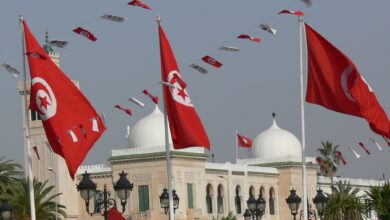Those who watched Al-Jazeera’s live coverage of the great protests in Tunisia should know that what happened in Tunisia is unlikely to happen in Egypt.
Tunisians who took to the streets chanted for freedom, equality, dignity, and nationalism. Many sang the words of Tunisian poet Abu Al-Qassem Al-Shabi: “When people decide to live, destiny shall obey.” Tunisian workers and union leaders spoke out more eloquently than most Egyptian university professors. All these facts make the situation in Egypt look depressing.
In Egypt, protests have lately taken a single, monotonous form, often rallying people around sectarian causes. The Egyptian regime, unlike its Tunisian counterpart, allows these protests to give citizens an opportunity to vent. This strategy serves to diffuse people’s anger and prevent the transformation of issue-specific protests into larger social and political movements.
The protests that took place in Tunisia reflect a healthy society. The Tunisian education system may be the best in the Arab world (the country’s illiteracy rate is no more than 10 percent), and the Tunisian General Labor Union actually defends workers’ rights. It respects the principles of trade unionism despite the fact that some of its leaders support the ruling party. In contrast, the state-run Egyptian Trade Union Federation (ETUF) runs itself in haphazard fashion and has distanced itself from independent worker organizations like the Real Estate Tax Collectors’ Union and the Center for Trade Union and Worker Services.
Egypt is also plagued by religious fundamentalism that has made it impossible for Egyptians to protest under the banner of universal values, such as freedom, equality, combating unemployment and demanding a minimum wage. Unlike Egypt, Tunisia is not home to any Salafi movements. Nor does it have preachers who boast thousands of followers and who lead many youth astray. Tunisia does not have a Muslim Brotherhood that is intent on mobilizing thousands of people to defend its own agenda rather than the national interest, nor does it have religious leaders who spread ignorance and sectarianism.
In sum, Tunisia had a healthy society and an autocratic regime. Egypt, on the other hand, has a less autocratic regime and society that needs miracles to reform itself.
Tunisians who took to the streets during the last month have often chanted that they would give their blood and souls for the General Labor Union. Egyptians, meanwhile, have been chanting for Islam and the Cross, neither of which is under any real threat. Rather, poverty, illiteracy, underdevelopment, and the absence of democracy are the biggest threats to Egypt. Confronting these problems requires effort, not blood.
Tunisia’s great revolt offers many lessons for how to do this. We salute its martyrs.
Translated from the Arabic Edition.




